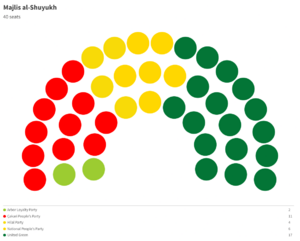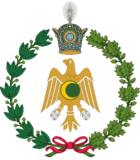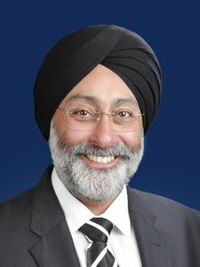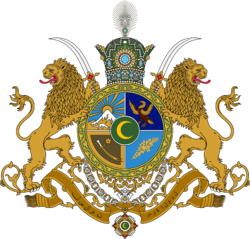1711 Çakaristan elections
| ← 1709 1711 1713 → Grand Vizier election year | |
| Election day | 3.II |
|---|---|
| Incumbent Grand Vizier | Jayanti Sinha |
| Electoral votes | 46 electors |
| Grand Vizier election | |
| Electoral vote | |
| Dervish Çelebi | 37 |
| Rahul Kayal | 9 |
| Majlis al-Shuyukh elections | |
| Seats contested | 16 of 40 seats |
 | |
| Distribution of seats in the Majlis al-Shuyukh after the elections | |
 | |
The 1711 Çakaristan elections were the second Grand Vizier elections since the restoration of the Çakar Empire. In these elections, the number of electoral votes and available seats in the Majlis al-Shuyukh had increased. This was due to the incorporation of Barikalus, Beneluccas and Kantisha and Northak Islands.
It was already clear beforehand that the incumbent Grand Vizier, Jayanti Sinha, would not stand for re-election. Her intended successor, Dervish Çelebi, was running on behalf of United Green. The only challenger was Rahul Kayal, on behalf of Çakari People's Party. Rahul Kayal launched a full on smear attack on the incumbent grand vizier's misses. He called Dervish Çelebi a puppet of Jayanti Sinha, but Dervish dissociated himself from this way of campaigning. In the first of three election debates, he dominated the narrative. "You can't rule a country with envy," Dervish fenced.
Grand Vizier election
Article 4.1 of the Akbar Constitution describes the election of Grand Vizier. The person must be a free citizen, at least thirty-five years of age and reside in the Empire for at least ten Norton years. Each governorate, riyasat and subah has as many electors as the total number of Shuyukh to which the governorate, riyasat or subah is entitled in the Çakari Congress. Each sarkar has one elector. The electors cast their ballots with the name of the candidate who received the most votes in their governorate, riyasat or subah.
Candidates
In the run-up to the election, eleven candidates applied. Of these, nine candidates withdrew prematurely and pledged their support for another candidate.
| Candidate | Political party | Home state | Details | ||
|---|---|---|---|---|---|

|
Dervish Çelebi | United Green | Poorajangal | He was mayor of Uttarkhet and two-term member of parliament (Majlis al-Sultina). | |

|
Rahul Kayal | Çakari People's Party | Sylfystan | Member of parliament (Majlis al-Sultina and Majlis al-Nuwaab) since 1691 and a candidate for the grand viziership several times. | |
Results
Dervish Çelebi retained the superstates that used to vote for Jayanti Sinha. He also won three superstates: Barikalus, Kendall Khanate and Sri Pashana. So he won in all the superstates. Rahul Kayal lost the superstate he had won earlier, he retained Bulqan and his home state Sylfystan.
All this resulted in victory for Dervish Çelebi:
- Dervish Çelebi:
- Rahul Kayal:
Majlis al-Shuyukh
One third of the Majlis al-Shuyukh is elected every two Norton years. The term of a Shuyukh is six Norton years. This is the forth election for the Majlis al-Shuyukh, that is the first re-election of seats that had been elected in 1705 AN, as well as an increase in the number of seats. A brief overview of the distribution of seats by party:
| Political party | Seats before | Seats after | Seats change | |
|---|---|---|---|---|
| Arbor Loyalty Party | 0 | 2 | ▲ 2 | |
| Çakari People's Party | 9 | 11 | ▲ 2 | |
| Hilal Party | 4 | 4 | 0 | |
| National People's Party | 6 | 6 | 0 | |
| United Green | 15 | 17 | ▲ 2 | |
Results per constituency
For the constituency that allocated Shuyukh seats in the Akbar Constitution, the summary of the results of these elections:
| Electable seats | Arbor Loyalty Party | Çakari People's Party | Hilal Party | National People's Party | United Green | |
|---|---|---|---|---|---|---|
| Barikalus | 2 | 2 | ||||
| Beneluccas | 1 | 1 | ||||
| Bulqan | 1 | 1 | ||||
| Haritdesh | 2 | 2 | ||||
| Kantisha and Northak Islands | 1 | 1 | ||||
| Kendall Khanate | 2 | 2 | ||||
| Korhalistan | 2 | 2 | ||||
| Leyl | 0 | |||||
| Poorajangal | 1 | 1 | ||||
| Sikatadesh | 1 | 1 | ||||
| Sri Pashana | 2 | 2 | ||||
| Sunehra | 0 | |||||
| Sylfystan | 1 | 1 | ||||
| Total | 16 |
See also
| ||||||||||||||||||||||||||||||||||||||||||||||||||||||||||||||||||
